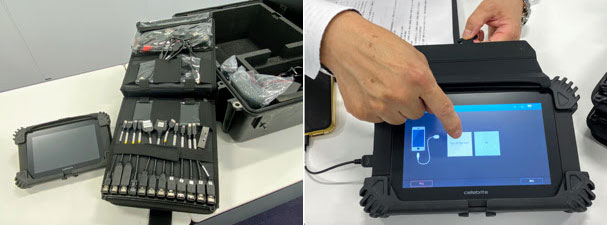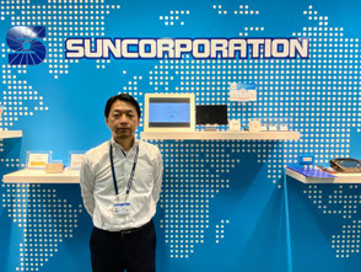サン電子株式会社 日イスラエル中堅・中小企業協業事例 【2020/11/8】
終了済
サン電子株式会社![]()
サン電子株式会社(以下、サン電子)は1971年創業、来る2021年に創業50周年を迎える。当初はエレクトロニクス関連機器の製造・販売を主事業とし、一宮立石電気(現オムロン)の自動券売機等を製造していた。70年代にはパチンコホールの自動管理システムや業務用ビデオゲーム、80年代には遊技機メーカーの新機種、90年代にはノートパソコンやメンテナンスサービス等オリジナル製品を開発、独自技術を蓄積してきた。現在は、「モバイルデータソリューション事業」、「エンターテインメント関連事業」、「新規IT関連事業」の開発・製造・販売を主たる業務内容とし、情報通信、ゲーム(SUNSOFT)、アミューズメント、モバイル関連、情報セキュリティの5領域で事業活動を展開している。2002年JASDAQ上場。2000年代からグローバル市場で積極的な投資を行い、2007年に後述するイスラエルのセレブライト社(現Cellebrite DI Ltd.)のM&A(合併・買収)を行い、子会社化した。同社との協業は、モバイル関連事業の成長を牽引し、グループ全体を大きく支える事業に発展している。
2020年3月期の第1四半期決算売上高は55億2千万円。うち、セレブライト社が関連するモバイルソリューション事業の売上は42億4千万円を占めた。従来行ってきたエンターテインメント事業は全体売上の16%程度となり、グループとしてはモバイルソリューションを主とする企業グループとなる。持分法適用関連会社のセレブライト、そして同社関連会社を含め国内外に18の孫会社および関連会社1社を持ち、グループ全体の社員数は1100名を超える(うち約70%弱がセレブライト社関連社員)。
・ 先端的なDI(デジタルフォレンジック=電子鑑識)技術による市場の独占
・ イスラエル要人、イスラエル人幹部を重視した円滑なコミュニケーション
・ 豊富な海外投資・協業実績、「夢・挑戦・創造」という創業時からのイノベーティブな発想
セレブライト社は1999年創業。創業時のオーナーは4名、社員数は30〜40名で、米国とイスラエルで電話帳移行サービスを手掛けていた。当時サン電子はシリコンバレーで同様のサービスを提供するフューチャーダイヤル社(FutureDial, Inc.)に出資し、持分法適用会社(筆頭株主)としていたが、業界界隈からセレブライト社オーナーの一部が株式売却を検討している情報を入手。2007年に買収を実行した(フューチャーダイヤル社の株式はこの後に売却)。
買収計画当初、イスラエル企業と協業する国内企業は見当たらず、サン電子が同業他社を保有していたこととも相まって、投資家からは協業に懐疑的な声も寄せられた。しかし当時の会長であった創業者・前田昌美氏が、セレブライト独自の技術UFED(Universal Forensic Extraction Device=携帯電話内部のあらゆるデータを抽出し、レポートを作成する技術)に着目し、最終的に買収を決定した。背景には前田氏が新規事業や製品開発に積極的で、以前からイノベーションを求める社風であったことが、決定を推進した要素として挙げられる。
セレブライト社はサン電子の子会社となった後、フォレンジック(鑑識、後のデジタルフォレンジッック=DI: Digital Intelligence[電子鑑識])ビジネスに本格参入する。ロックされている携帯電話端末内のデータを抽出し、デコードする技術を開発・応用することで、犯罪捜査向けの解析ソリューションへと発展した。対応可能機種を次々に増やし、2009年頃からは米連邦捜査局(FBI)や各州警察の犯罪捜査への協力を通じて、事業を飛躍的に成長させる。2016年にはDI部門と並行して進めてきたMLC(Mobile Life Cycle=携帯電話の新機購入から中古売却)部門を分社化し、2018年には米投資ファンドに売却、DI事業に特化した。業界をリードする優れた技術は、サン電子がセレブライト社のサービスを日本で展開する上で大きく寄与し、国内市場をほぼ独占している。

犯罪捜査機関向けのモバイルデータトランスファー機器「Cellebrite UFED Touch2」
これまでの協業で重視したのは、1)経営を現地イスラエル人幹部に任せること、2)M&A初期の仲介役をイスラエル要人に委ねることで円滑なコミュニケーションを行うこと、3)コアな技術とFBI等捜査機関で既に導入されている信頼性を、日本展開においても活かすこと、の3点である。1)において、特に買収から協業プロセスでは証券会社アドバイザーのほか、日本―イスラエル両国間で幅広い人脈を形成する現地人アドバイザーを橋渡し役とした。両国で長く勤務し、日本人・イスラエル人の価値観や商習慣を理解する人物がいたことが、協業を成功させる鍵となった。2)は「急成長する企業の経営は、現地幹部に任せたほうがよい」という前田氏の判断である。サン電子の社員は現地に常駐せず、日本顧客向けの技術開発を含めた幹部とのコミュニケーションは、先の橋渡し役人物を中心に、サン電子社員による長期出張によりカバーした。3)はセレブライト社の先端技術と米国での事業展開が、日本進出に際し大きな実績となり、警察庁、警視庁、検察庁、税関をはじめとした法執行機関が次々と同社サービスを導入することに繋がった。
同社は当時の30人規模の体制から、現在では約600人のエンジニアを抱える規模に拡大し、なお成長し続けている。イスラエル企業でありながら、「親会社が日本企業である日系企業」という特徴を生かし、同国内での税制優遇、宗教の異なる東南アジア諸国の市場開拓も叶えた。
セレブライト社との協業を核とした、サン電子のモバイルソリューション(DI)事業売上高は、直近3カ年比較で約85億円から約190億円へと急拡大している。デジタルフォレンジック市場における各国行政機関の安全保障に対する意識の高まりは、デジタル化の進展や犯罪捜査手法の進化等に伴い幅広い需要を生み出し、市場は堅調で今後も持続的成長が見込まれる。ストック受注推移では2016年からの年平均成長率が28%を示していることから、サン電子は技術的な差別化をベースに新規の取り組みで成長を加速し、結果としてシェア拡大率も2016年から年平均28%(約82億円)と大きく飛躍した。
同社の中長期的経営戦略は、1)情報通信(セキュリティ、コンテンツ、通信)関連分野での新たな顧客価値の創造 2)エンターテインメント(遊技機)関連分野でのシェア拡大 3)グローバル市場におけるビジネス構築及び拡大モバイルデータソリューション事業の拡大、である。社の長期的持続成長のため、セレブライト社が関わるモバイルデータソリューション事業には今後も攻めの投資を継続し、差別化された製品・サービスの開発と中長期的な高収益体質の実現を目指していく。
サン電子はこれまでも、シナジー効果が見込まれるビジネスパートナーとの資本提携等を積極的に行っており、直近では2020年1月にアップル向けのPCフォレンジックに特徴を持つ、米ブラックバッグ・テクノロジーズ社(BlackBag Technologies, Inc.)の株式を、セレブライトを通じて取得、孫会社化した。PCフォレンジック分野のノウハウを活かし、犯罪捜査に重要なデータの活用に貢献する分析システムの機能強化を目指している。このeディスカバリー(e-Discovery)と呼ばれる電子情報開示分野では、イスラエルの他企業との交渉も進めており、海外の先端技術とサン電子の国内販売網を生かした事業を積極的に推し進めていく。
一方でセレブライト社との協業によりサン電子の市場性も高まっており、2020年4月には株主発議により役員が一新される動きがあった。セレブライト社も独自に日本支社を構えたことで、現在は本社とのやり取りに複数の階梯を必要とし、協業は新たな変革期に入ったといえるだろう。

モバイルソリューション事業部 事業部長 纐纈正典(こうけつ・まさのり)氏
|
会社名 |
サン電子株式会社 |
|
代表取締役社長 |
木村 好己 |
|
設立 |
1971年4月16日 |
|
資本金 |
10億1600万円(2020年3月31日現在) |
|
従業員数 |
連結1135名 単体353名(上記現在) |
|
住所 |
本社: 〒453-6120 名古屋市中村区平池町四丁目60番12 |
|
電話番号 |
052-756-5986 |
|
Website |
取材: 早稲田大学イノベーション・ファイナンス国際研究所
編集: (一財)国際経済連携推進センター
<関連リンク>
 全文
全文